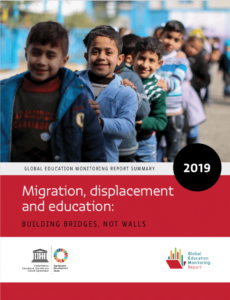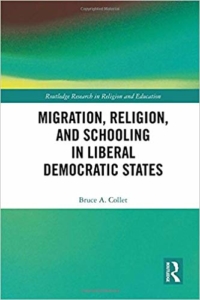Posts
Higher Education in Crisis?
Migrações, educação e identidade cultural do povo saharaui
Migrações, educação e identidade cultural do povo saharaui
Migrações Internacionais e o Direito à Educação
Migrações Internacionais e o Direito à Educação
Educación Migrante Episodio 3
Educación Migrante Episodio 3
Educación Migrante Episodio 1
Segunda Mini-Serie
Daniela Hernández Silva
Some thirty-five percent of out-of-school children live in conflict-affected areas. These emergency situations include both human conflicts, such as, war and natural disasters, such as earthquakes. These children are in desperate need of help. Yet before anyone can act, information is critical. Information and data on education in emergencies is, however, inadequate in most cases.
My guest today is Mary Mendenhall, an Associate Professor of Practice and the Director of the International and Comparative Education program at Teachers College, Columbia University. She is a member of the Inter-agency Network for Education in Emergencies’ (INEE) Standards and Practice Working Group and has edited a new NORRAG special issue on data collection and evidence building to support education in emergencies.
Citation: Mendenhall, Mary, interview with Will Brehm, FreshEd, 158, podcast audio, June 10, 2019. https://www.freshedpodcast.com/marymendenhall/
Transcript, Translation, and Resources:
Building Evidence on Education in Emergencies
 Today we bring you a special episode of FreshEd. With me is Manos Antoninis, the Director of the Global Education Monitoring Report, which was just released.
Today we bring you a special episode of FreshEd. With me is Manos Antoninis, the Director of the Global Education Monitoring Report, which was just released.
Each year, UNESCO publishes an editorially-independent Global Education Monitoring Report to monitor the progress towards the education targets in the Sustainable Development Goals. This year’s topic is migration, displacement, and education.
Based on evidence from around the world, the report argues that investing in the education of mobile people can actually create cohesion and peace. Of course, there are many challenges facing children, teachers, policymakers, and society from the displacement and migration of large numbers of people.
The 2019 report is entitled Migration, Displacement, and Education: Building Bridges, not Walls and is available online now.
Citation: Antoninis, Manos, interview with Will Brehm, FreshEd, 136, podcast audio, November 20, 2018. https://www.freshedpodcast.com/antoninis/
Transcript, Translation, and Resources: Read more
2019 Global Education Monitoring Report
The images and stories of migrant families being separated by the United States government set off a global conversation about immigration, borders, and justice. If the political philosophy of liberalism is based on liberty and equality, then the events of the past few months have challenged the very core of liberal democratic states.
My guest today is Bruce Collet. He researches migration and public schooling, with a special interest in migration, religion, and schooling in democratic states. He’s thinking through what we might call liberal multiculturalism as well as issues around security.
Bruce Collet is a Professor in Educational Foundations and Inquiry at Bowling Green State University in Ohio. He is the author of Migration, Religion, and Schooling in Liberal Democratic States (Routledge, 2018), and Editor of the journal Diaspora, Indigenous, and Minority Education.
Citation: Collet, Bruce, interview with Will Brehm, FreshEd, 121, Podcast audio, July 2, 2018. https://www.freshedpodcast.com/brucecollet/
Transcript, translation, and resources:
Migration, religion, and schooling in democratic states


